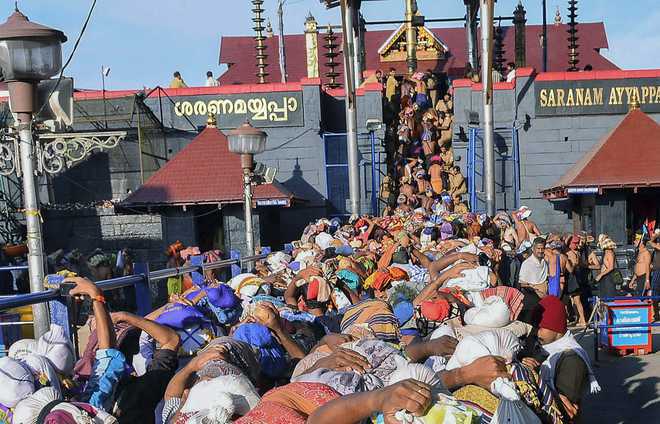
In a long-awaited milepost toward gender evenness and women’s emancipation, a five-judge Constitutional Bench, headed by CJI Dipak Misra, on Wednesday made way for the entry of younger women to the 12th century Sabarimala Temple, declaring “when a man can enter, a woman can also go”. In upholding the religious and constitutional rights of women, the Supreme Court has overruled the rusty 1991 Kerala High Court order banning the entry of menstruating women, aged between 10 and 50, to the ancient temple, stating that such restriction was in accordance with the usage prevalent from “time immemorial”. The High Court had even directed the state government to use police force to ensure the ban was complied with.
The ban was discriminatory and outright regressive. Whether the bar on age has existed for centuries is arguable; what is not, is that the sex of a devotee or the age or a biological process does not in any manner contaminate an act of piety or impede an individual’s spiritual experience or defile religious premises. The Creator, surely, would not be overly troubled by the gender of His worshipper, as women are continually made to believe. Denying a young woman access to a place of worship is violative of her religious freedom assured under Article 25(1) of the Constitution. BR Ambedkar had proclaimed that public temples, like public roads and schools, were meant for public — which by definition includes women — access.
Sabarimala is one of the largest pilgrimages in the world, with an estimated annual count of over four crore. The vacuous excuses offered for the ban are as strange as they are varied: Lord Ayyappan is depicted in vanaprastha (form of renunciation); the deity is celibate; menstruating women are impure; safety of women owing to the long, treacherous journey through deep forests and big mountains to the temple. Regardless, what is fine for a man, ought to be fine for a woman. Such restrictions are not religion-specific. Mosques, dargahs and even some churches are closed to women. In the neoteric 21st century, there should be no room for practices and prejudices of the 12th century. No one should come between an individual and her God. That surely would be ungodly.



























